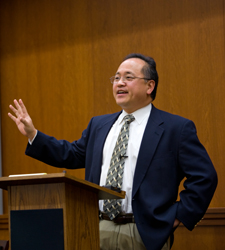
Recent book proposes critical framework for analyzing and regulating networks.
On Monday, October 24, three of the nation’s leading experts on telecommunications law and competition policy convened in the Faculty Lounge to celebrate Christopher S. Yoo, the Law School’s John H. Chestnut Professor of Law and the Director for the Center of Technology, Innovation & Competition, and his recent book, Networks in Telecommunications: Economics and Law, which he co-authored with Daniel F. Spulber. The Hon. Stephen Williams, a judge on the U.S. Court of Appeals for the D.C Circuit, Herbert Hovenkamp, the Ben and Dorothy Willie Professor of Law and History at the University of Iowa, and Howard Shelanski, a Professor of Law at Georgetown University, joined Yoo in the symposium to reflect on his groundbreaking book and its important implications for regulatory policy and the law of networks.
Speaking to a room of Penn Law faculty and students, moderator and Edward B. Shils Professor of Law Cary Coglianese opened the evening’s event with a few words about Yoo’s new book.
“The argument of the book,” Coglianese explained, “can be encapsulated by one sentence: ‘Markets, rather than regulators, should determine access to networks.’”Coglianese continued on to say how this central theme in Networks in Telecommunications is an important one in an era where the global economy depends on telecommunications networks. He also praised Yoo for developing his argument methodically with great detail and precision, whether he was presenting an in-depth analysis of graph theory or of the law and economics of regulation.
Judge Williams agreed with Coglianese’s praise.
“I definitely want to second what Cary said about the quality of the book,” Williams said, adding that it proved to be a very illuminating read that earned one of the more “prominent places” on his bookshelves.
Williams also appreciated the book’s argument about monopolies among networks. He agreed with many of Yoo’s critiques of access mandates, adding that such requirements often cause networks to turn into “a fully regulated monopoly, which is hardly conducive to innovation or efficiency.”Professor Hovenkamp took the podium next to offer his commentary on Yoo’s book.
“The thing I really like about Christopher’s book is that it’s technical but very approachable,” Hovenkamp said. “It will be talked about for a long time, and I expect it to be cited many, many times in both the academic literature and the case law.”
Hovenkamp also strongly agreed with Yoo’s argument that regulations infringe too much on networks — a mistake that discourages innovation, which is a crucial component to the world of technology. Regulatory policy, Hovenkamp said, “approaches the problem with a machete rather than a scalpel, and the result is that it probably creates very significant deterrents to innovation.”

Professors Christopher Yoo, Howard Shelanksi, and Cary Coglianese
Professor Shelanski also echoed sentiments expressed by the two earlier commentators on regulation.
Poorly designed regulatory policy, Shelanski argued, “can render the whole architecture inefficient, and greatly affect forward-looking decisions about how the network will evolve.”
Although Shelanski agreed that the book serves as a cautionary tale for regulatory policy, he added that unfortunately the regulatory agencies have at times failed to pay attention to the kinds of concerns the book raises.
Professor Yoo also gave his response to the three commentators and talked about the process of writing his book at the end of the evening’s symposium.
“The goal of the book was very simple in many ways,” Yoo explained. “We never really understood how networks work. They’ve been a black box.”
In the modern world, however, the importance and influence of networks extend beyond just a black box. The book looks for new insights into the regulation of networks by delving into this “remarkably under-theorized, under-studied area.”
Yoo noted after the event that his only regret was that his co-author was unable to be part of the celebration.
For audience member Jonathan Mincer L’12, the book symposium proved to be a thought-provoking experience.
“Professor Yoo focused on the importance of understanding a system before regulating it,” he said. “On the other hand, Professor Shelanski brought up the interesting point that sometimes entrenched systems need to be changed for the common good.”
Mincer was impressed with the symposium’s commentators. “These are three luminaries in the fields of antitrust and regulation, so it was a real honor to see them,” he added.
Professor Coglianese viewed the event as a resounding success.“We are very fortunate to have this great book to talk about, as well as three distinguished commentators from the fields of antitrust and regulatory policy,” he said. “The event generated a rich and healthy discussion with significant implications for the future of technology and the Internet.”



